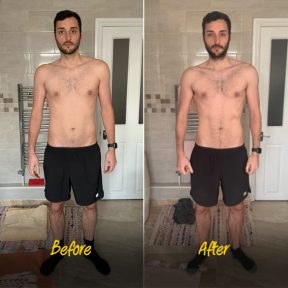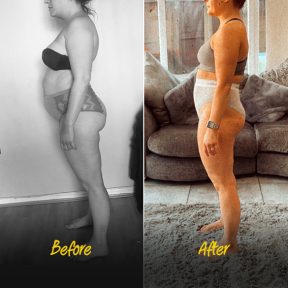Signs and symptoms of overtraining
Something I try to encourage my clients is to have rest days, this could mean a nice walk outdoors/ bike ride/ steady swim or run. Training hard every day or over training can have its drawbacks, as detailed below.
1. Not eating enough
Weightlifters who maintain an intense training schedule may also cut back on calories. This can negatively affect health and performance. If your body consistently draws on its energy reserves, you may develop nutritional deficiencies such as anemia. More serious conditions can arise that affect your cardiovascular, gastrointestinal, and endocrine systems. It’s also possible to develop nervous system and reproductive system complications, including period loss or irregular cycles.
2. Soreness, strain, and pain
Pushing yourself past your limits during a high-intensity interval training (HIIT) workout can lead to muscle strain and pain. Overstressing your body can cause soreness and injuries. You may experience microtears in your muscles as well.
3. Overuse injuries
Running too often can lead to overuse injuries such as shin splints, stress fractures, and plantar fasciitis. Other overuse injuries include joint strains, broken bones, and soft tissue injuries.
High impact exercise such as running puts stress and wear and tear on your body. If you have an injury, take a break from all types of training to allow it to heal.
4. Fatigue
It’s somewhat normal to feel tired after exercise, but fatigue happens when your body repeatedly doesn’t fully recover after you work out. You may feel excessively drained, especially during or right after workouts. Fatigue can also set in when you regularly don’t get enough fuel before you train. Your body then has to use its carbohydrate, protein, and fat reserves for energy.
5. Reduced appetite and weight loss
Working out usually leads to a healthy appetite. However, working out too much can cause hormonal imbalances that can influence how hungry or full you feel. OTS can cause exhaustion, decreased appetite and weight loss.
6. Irritability and agitation
Overtraining can affect your stress hormone levels, which can cause depression, mental fog, and mood changes. You may also experience restlessness and a lack of concentration or enthusiasm.
7. Persistent injuries or muscle pain
Extended muscle soreness and injuries that don’t heal are also signs of overtraining. You may have chronic injuries or nagging injuries that linger for a long time.
Rest between workouts is vital to recovery. It’s harder for your body to heal when too much stress is placed on it.
8. Decline in performance
Overtraining can cause your performance to plateau or decrease rather than improve. You may find you have less strength, agility, and endurance, which makes it more difficult to reach your training goals. Overtraining can also slow your reaction time and running speed.
9. Workouts feel more challenging
If you have OTS, you may feel like your workouts are more difficult, like they take more effort to complete. This increase in your perceived effort can make you feel like you’re working harder even though your body is working at its usual rate. You may have a higher heart rate while you’re working out and a higher resting heart rate during the day. Additionally, your heart rate may take longer to return to its resting rate once you finish exercising.
10. Disturbed sleep
When your stress hormones are out of balance, you may find it hard to relax and let go of tension at bedtime. This cuts into the crucial time your body needs to rest, repair, and restore itself during sleep. Lack of quality sleep can also lead to chronic fatigue and mood changes.
11. Decreased immunity or illness
Along with feeling run-down, you may find you get sick more often. You may also be prone to infections, mild illnesses, and upper respiratory tract infections (URTIs).
12. Weight gain
Exercising too much without resting enough in between can lead to low testosterone levels and high levels of cortisol, the stress hormone. These hormonal changes are often associated with loss of muscle tissue, weight gain, and excess belly fat.
13. Loss of motivation
You may find it difficult to stay motivated to work out. This can be due to mental or physical exhaustion, the feeling that you’re not achieving your fitness goals, or lack of enjoyment. Either way, try to make positive changes so you can feel inspired again.
When to take a break
Take an extended break from training if you have any injuries that need time to heal completely or if you’re experiencing burnout. During this time, stay away from any high impact or intense forms of exercise. Give yourself time to make a full recovery.
Treatments
Several treatments and home remedies can promote healing. Rest is the most important factor. Relax and take a break from all activities. Slow down in all areas of your life.
Go for a professional massage that will target the affected muscles. Opt for a deep-tissue or sports massage to prevent injuries and relieve muscle tension. If a professional massage isn’t an option, you can do self-massage using essential oils or a muscle balm. Hot and cold therapy are also options. You can use a heating pad, sauna, or hot bath to soothe aching muscles. A cold shower or ice pack may help reduce pain and swelling.
Recovery
Individual recovery times will vary. If you take a complete break from activity, you can expect to see improvements after 2 weeks. However, it may take up to 3 months before you’re fully healed.
During this time, you can do gentle exercise to stay active. Listen to your body during this important time. If you begin training again and start to experience symptoms of overtraining, return to resting.




